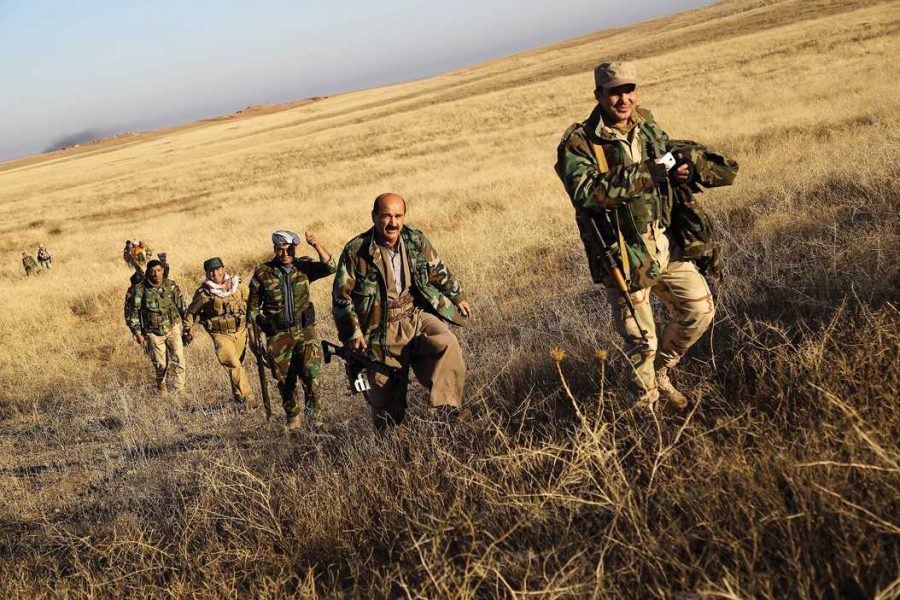The civil war in Syria and occupation of Iraq seems to be never-ending as the Islamic State gains ranks in both areas and the number of civilian casualties increase.
We often hear U.S. leaders — presidential candidates included — advocating their plans for combating the Islamic State since the rise in terrorism fears after attacks in Paris, Belgium and recently — although not confirmed as terrorism — the recent bombings in New York and New Jersey.
The Obama administration has notably been scrutinized multiple times for not being aggressive enough in its attempts to combat the Islamic State. But last week, the Obama administration, through discussions by the National Security Council, said it was considering directly arming the Kurdish Syrian Army as a means of increasing efforts against the Islamic State.
Many U.S. military commanders agree with the move. The New York Times reported that they believe the Kurds are the best bet in overthrowing the Islamic State’s current regime in Raqqa, also known as the caliphate. The United States is reluctant to make this decision for fear of harming already-tense relations with Turkey — an American ally — which has a territorial rivalry with the Kurds.
However, the arguably more consequential reason against directly arming the Kurds is because the decision can, and will, result in more violence and casualties in Syria and Iraq. It’s extremely important to note the sheer amount of violence and bloodshed currently present in the Islamic State’s territory as a result of its violent measures. If history has taught us anything, arming rebels will only make conditions worse.
The Syrian Observatory for Human Rights’s website details an increasingly high number of violent acts in Syria. A recent article on the site talks about a video of “atheist Kurds” being beheaded by ISIS fighters.
It is also important to realize that many civilian casualties are likely the result of U.S. intervention via airstrikes. According to Airwars, a nonprofit formed to document international airstrikes against the Islamic State, the minimum number of civilian casualties by international air strikes, including those of the United States, has reached 1,608.
By arming the Kurds, the United States is only going to escalate the existing conflict and inadvertently increase the number of casualties of Kurdish soldiers and civilians alike. The U.S. has similarly armed “moderate” Syrian rebels in the Middle East in the past. The Guardian reported that prior U.S. involvement in training and arming rebels in Syria resulted in many of those rebels being killed and/or kidnapped.
With this information, the United States needs to ask itself how it could alleviate the violence in Syria and Iraq instead of furthering it through seemingly more violence.
Research conducted by scholars Erica Chenoweth and Maria J. Stephan sheds light on ways the United States can address the conflict. An essay the pair wrote in Foreign Affairs compared the effectiveness of nonviolent resistance and violent resistance against authoritarian regimes — similar to ISIS-controlled areas like Raqqa. Chenoweth and Stephan analyzed 323 campaigns, each involving over 1,000 participants, that took place between 1900 and 2006.
Their research suggests that nonviolent methods of resistance, such as peaceful protests and civil disobedience, are superior to violent methods and are twice as likely to succeed.
“Movements that opt for violence often unleash terrible destruction and bloodshed, in both the short and the long term, usually without realizing the goals they set out to achieve,” they note in the essay.
The researchers’ reasoning for why nonviolent resistance is comparatively more successful is because nonviolent movements simply attract a larger and more diverse set of participants. They referenced Iran’s last shah, Mohammad Reza Pahlavi, who served as an oppressive ruler from 1941 to 1979. After Iran’s citizens collectively participated in nonviolent actions, including boycotts and strikes, against him prior to the Iranian Revolution, the Shah could no longer sustain his rule and basically “fled.”
A nonviolent Syrian group, Raqqa is Being Slaughtered Silently, formed on the premise of informing the world of the horrendous acts of terror and violence in Raqqa. The group members risk their lives by smuggling images, videos and documents out of Syria exposing the atrocities. The images are then uploaded on their website and social media accounts.
A group of RBSS members, profiled in an essay by the New Yorker, detail the group’s experiences in Raqqa as ISIS began to infiltrate the city. RBSS claimed that ISIS “spread panic” with extremely violent measures, including beheadings and crucifixions. One of the members even said that many of the people in Raqqa that joined ISIS did so not because they believed in the cause but because they wanted to protect themselves and their families.
Another member of RBSS told Vice that although most of the city doesn’t support ISIS, there aren’t many activist organizations pushing for change.
RBSS is an example of a group using nonviolent measures as a means of resistance. Through the internet and social media, the group makes the horrors of Raqqa committed by ISIS accessible to the rest of the world. If more people in the United States and other countries understand what is occurring in places under the Islamic State, then perhaps the intervention would be more humanitarian than airstrikes.
Instead of directly arming the Kurds, which not only promotes overall violence but also puts citizens and our allies at risk, the United States should consider instructing on nonviolent methods. Although this may seem naive given the current state of excessive violence in areas controlled by the Islamic State, history has proven that arming the rebels can have detrimental, unintended consequences.
If most of those affected by the Islamic State truly disagree, then the United States and other “liberating” countries should try to understand how to empower and inform the majority of civilians oppressed in effective ways — not add more violence to the mix.
Write to Julia Aldrich at [email protected]



